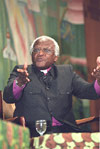
International affairs, peace
and human security

|
|

| |

|
|

|
|

|
|
 |
|

|
|
 |
|
 |
IMPUNITY, TRUTH, JUSTICE & RECONCILIATION The history of Truth & Reconciliation Commissions (TRCs) can be traced to the mid 1970s . They were particularly important in Latin America where, in countries like Argentina and Chile, they were established after military dictatorships. In the last years we have been witnesses of how Truth and Reconciliation Commissions (TRC) spread around the world, with some common elements: |
SEE ALSO:
"Las Comisiones de Verdad y Reconciliación como estrategia democrática", presentación en la Panel 5: Estrategias democráticas para la solución de conflictos internacionales, Foro Social Mundial - Porto Alegre 24-28 de enero de 2003 |
||||
Other elements have differed in the various commissions:
- the presence of international experts;
- the granting of amnesty to perpetrators who voluntarily attend the commission public hearings, as was the case of the South African TRC;
- the relationships with ordinary criminal procedures.
It is interesting to note the addition of the word "Reconciliation" to these Commissions. Truth commissions have been an instrument to deal with issues related to human rights violations in more than twenty countries in the last three decades. But only in the last decade, after the South African Truth and Reconciliation Commission, did these two concepts become a "trademark" of such initiatives.
Although they are related to the individual, some of the classic moments in a reconciliation process, as understood by the Christian churches, can offer some criteria of discernment to pursue true reconciliation.
One of these is the moment of confession. In it, the sinner recognizes the sin he/she has committed and asks for forgiveness. Confession includes the acknowledgement of the violation committed, of the harm produced and the acceptance of one's own responsibility.
"Truth is not something fixed, abstract, an absolute value, 'Veritas', but something painfully built through the sharing of memories, experiences, sadness and hope." (Guillermo Kerber)
The reconciliation of the society is one of the requisites of restorative justice procedures. At the communal level, it is quite clear that restorative process’ methodologies have as goal not only to restore relationships between victims and offenders, but also within the whole community. Shifting from community to national and international level on restorative justice procedures is still a big challenge.
The process of bringing their stories, cases before a court and to the public is in itself a process of restoring human dignity. When you witness the testimony-taking procedures, you can see the changes in the faces of the victims and, in some cases, of the perpetrators.
From the Christian theological perspective, "true reconciliation is an eschatological process that doesn’t reach its perfection in history, but is a never reachable, however obligatory, aim" (COMBLIN, Joseph, Teologia de la reconciliacion, Conference at the Congress of Moral Theologians in Latin America, January 2002).
Perfect reconciliation can never be reached, but is a constant exigency. In other words, the circle of reconciliation is open, it is not closed.

